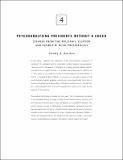| dc.contributor.author | Renshon, Stanley A. | |
| dc.date.accessioned | 2010-06-17T14:33:36Z | |
| dc.date.available | 2010-06-17T14:33:36Z | |
| dc.date.issued | 2004-01-04 | |
| dc.identifier.uri | http://hdl.handle.net/1721.1/55926 | |
| dc.description.abstract | In this paper I address the usefulness of the psychoanalytic framework in studying U.S. presidents and by implication political leaders more generally.1 I ask why such a framework is important for studying political leaders before I proceed to how it might be done—or at least how I have found it useful to do it.2 This paper is not meant to provide a finished analysis of either William J. Clinton or George W. Bush. Rather, its purpose is to provide a sense of how psychologically framed analyses unfold and, more specifically, the kinds of questions that such an analysis asks. That task is central since in scholarship, as in psychoanalytic work, the most important and useful tool to have at your disposal is the question. The analysis that follows is divided into four parts. The first examines the nature of psychoanalytic theory, focusing on what all such theories have in common and why they are necessary parts of any full analysis of a president’s behavior. The second section focuses on alternatives to psychoanalytic frameworks and why they are helpful, but not fully so. The third section takes up the issue of how such analyses unfold, using illustrations from two contemporary presidents, William J. Clinton and George W. Bush. The fourth and final section considers a very basic issue in undertaking such analyses: the analyst’s stance toward his subject. | en_US |
| dc.publisher | Center for Public Leadership | en_US |
| dc.relation.ispartofseries | Center for Public Leadership Working Paper Series;04-04 | |
| dc.rights | Attribution-Noncommercial-No Derivative Works 3.0 United States | en |
| dc.rights.uri | http://creativecommons.org/licenses/by-nc-nd/3.0/us/ | en |
| dc.subject | hks | en_US |
| dc.subject | leadership | en_US |
| dc.subject | cpl | en_US |
| dc.subject | kennedy school | en_US |
| dc.subject | clinton | en_US |
| dc.subject | bush | en_US |
| dc.subject | president | en_US |
| dc.subject | psychoanalysis | en_US |
| dc.title | Psychoanalyzing Presidents Without a Couch: Lessons from the William J. Clinton and George W. Bush Presidencies | en_US |
| dc.type | Working Paper | en_US |

